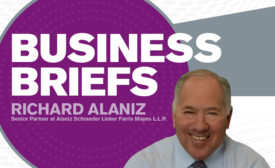Articles by Richard D. Alaniz
A Look at President-Elect Trump’s Pro-Business Labor Nominee
Trump nominated fast food executive Andrew Puzder to head the Department of Labor
Read More
What President Trump Means for Labor and Employment
Changes could take effect soon after Trump assumes office
Read More
New Rules Make Many More Eligible for Overtime
The implications could be very negative for many employers
Read More
Federal Regulators Make Life Easier for Unions
Employers need to understand the current atmosphere, what new actions mean
Read More
Voting in the workplace
How to ensure your business stays compliant with state, federal laws
Read More
Regulations, Executive Orders, and Court Rulings - Part 2
More information on what employers need to know now
Read More
Copyright ©2024. All Rights Reserved BNP Media.
Design, CMS, Hosting & Web Development :: ePublishing



